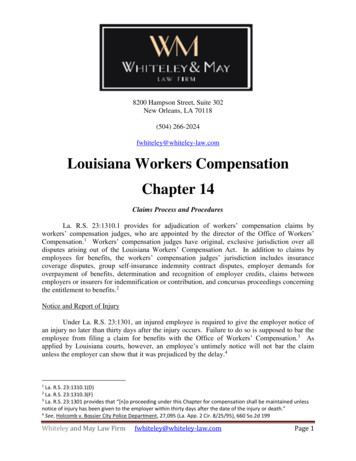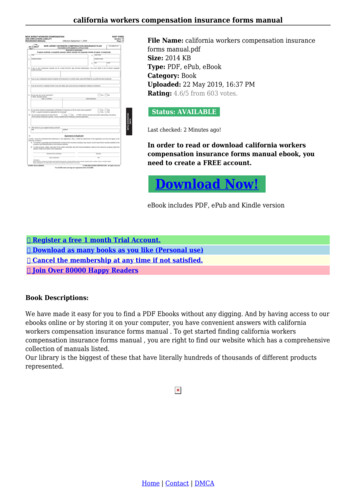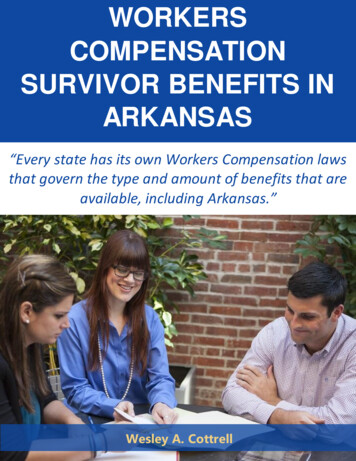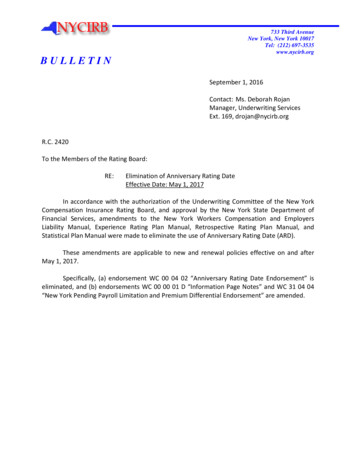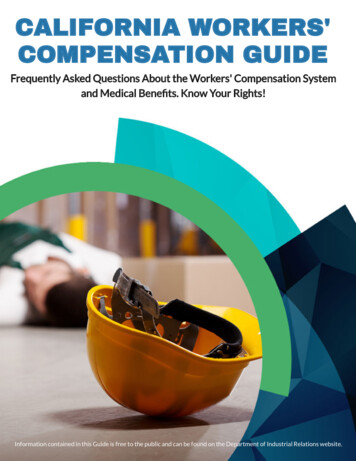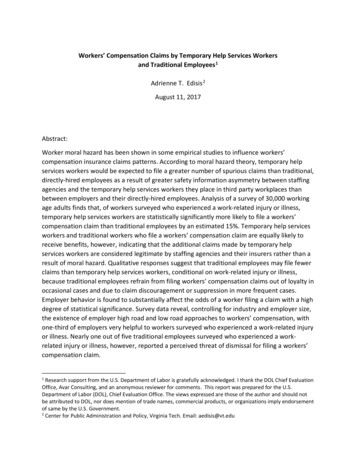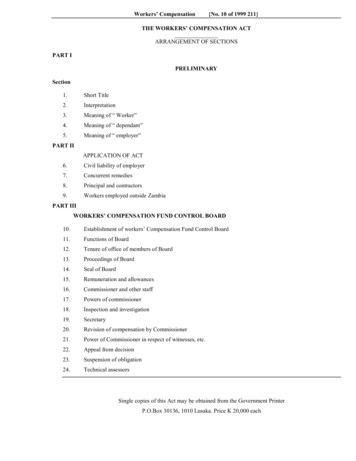
Transcription
Workers’ Compensation{ o. 10 of 1999 211}THE WORKERS’ COMPE SATIO ACTARRANGEMENT OF SECTIONSPART IPRELIMI ARYSection1.Short Title2.Interpretation3.Meaning of “ Worker”4.Meaning of “ dependant”5.Meaning of “ employer”PART IIAPPLICATION OF ACT6.Civil liability of employer7.Concurrent remedies8.Principal and contractors9.Workers employed outside ZambiaPART IIIWORKERS’ COMPE SATIO FU D CO TROL BOARD10.Establishment of workers’ Compensation Fund Control Board11.Functions of Board12.Tenure of office of members of Board13.Proceedings of Board14.Seal of Board15.Remuneration and allowances16.Commissioner and other staff17.Powers of commissioner18.Inspection and investigation19.Secretary20.Revision of compensation by Commissioner21.Power of Commissioner in respect of witnesses, etc.22.Appeal from decision23.Suspension of obligation24.Technical assessorsSingle copies of this Act may be obtained from the Government PrinterP.O.Box 30136, 1010 Lusaka. Price K 20,000 each
212, o. 10 of 19991}Workers’ CompensationSection25.Appointment of actuary26.Actuarial valuation of Fund27.Action on actuarial reportPART IVMEDICAL EXAMI ATIO S, CERTIFICATES OF FIT ESS A REPORT28.Application of Part IV29.Types of certificates30.No employment without or in breach of, a certificate of fitness31.Application forms for prescribed examination32.Delivery of previous certificate before new examination33.Stages of pneumoconiosis34.Initial examinations35.Periodical examinations36.Employer to arrange examination on expiry of certificate of fitness37.Persons eligible for periodical examination38.Issue of periodical certificates of fitness39.Examination of miners before leave or discharge40.Description of examination41.Miners suspected of compassable disease to be examined42.Examination for benefits43.Additional examination on miners request44.Period of validity of certificate45.Power to correct certificate of fitness46.Issue and custody of certificate of fitness47.Lost or destroyed certificates of fitness48.Examiner to issue reports49.Post mortem examination50.Examiner may direct post mortem examinationPART VRIGHT TO COMPE SATIO 51.right to compensation52.Accident during first-aid training or rescue work53.Compensation not affected by other pension54.Successive awards of compensation
Workers’ Compensation{ o. 10 of 1999 213Section55.Contracting our prohibited56.Deductions from earning prohibited57.Death or disablement attributed to effects of medical treatment58.Circumstances precluding award of compensation59.Cessation and revival of periodical payments60.Suspension of right to periodical payments61.No abatement of compensation if worker insured62.Contract of service not to be terminated during disablement63.Wages for work done64.Workers not entitled to periodical paymentsPART VILIABILITY FOR COMPE SATIO A D AMOU T OF COMPE SATIO 65.Liability to pay compensation66.Amount of compensation for total disablement67.Amount of compensation for partial disablement68.Limit of time for periodical payments69.Amount of compensation for permanent disablement70.Further medical aid while receiving pension71.Amount of compensation for death of workers72.Compensation where worker in receipt of pension dies73.Diminution of children’s allowances74.Child over seventeen may continue to receive allowances75.Pensioner absent from country76.Dependant absent from country77.Pension to cease on remarriage and gratuity to be paid on remarriage78.Commissioner to be informed of death of pensioner, etc.79.Method of calculating earnings80.Calculation of earnings of permanently disabled worker under twenty-one years.81.Payment of lump sum in lieu pension82.Worker requiring constant attendance83.Control of payment of compensation84.Where employer is liable to pay compensation
214 o. 10 of 1999}Workers’ CompensationSection85.Advances against compensation86.Review of pension and allowancesPART VIIPROCEDURE FOR OBTAI I G COMPE SATIO 87.notice of accident or disease to be given88.Employer to give notice of accident, disease to Commissioner89.Additional information to be supplied90.Entry of judgment in favour of board91.Worker to furnish medical certificate92.Commissioner may require medical reports, etc.93.Commissioner may call evidence94.Worker claiming compensation to submit to medical examination95.Procedure upon information of accident96.Procedure on presentation of claim97.Provisional settlement of claim by exempt employer98.Commissioner may require employer to make periodical paymentsPART VIIIMEDICAL AID99.First aid100.Conveyance of injured worker101.Medical aid expenses102.Decisions of Commissioner in regard to medical aid103.Power to prescribe fees for medical aidPART IXCOMPE SATIO FU D104.Establishment of Fund105.Application of Fund106.Payment of compensation by Commissioner in respect of accidents arising under repealed Act
Workers’ CompensationSection107.Powers of Board108.Holding of Assets of Fund109.Accounts and AuditPART XASSESSME T110.Liability to assessment111.Exemption112.Employers to submit information113.Assessment on employers114.Assessment variations115.Assessment of employers of domestic workers116.Contributions by exempt employersPART XIWORKERS’COMPE SATIO TRIBU AL117.Establishment of Tribunal118.composition of Tribunal119.Tenure of office of member120.Vacation of office of member121.Remuneration of members122.Secretariat of Tribunal123.Functions of Tribunal124.Decision of Tribunal125.Procedures of Tribunal126.Representation of Paties127.Powers of Tribunal128.Summoning of Witnesses129.Witnesses failing to attend130.False evidence131.Witnesses’s expenses{ o. 10 of 1999215
132.Costs133.Appeal to high courtPART XIIMISCELLA EOUS134.Employer to supply particulars of business135.Employers to keep record216 o. 10 of 1999}Workers’ CompensationSection136.Threats and compulsion137.False statements138.Failure to pay assessments, etc.139.Compensation not to form part of deceased worker’s estate140.Recovery of benefits paid in error141.Priority of payment142.Compensation not to be assigned, etc.143.Evidence144.Reciprocal arrangements145.Summary of procedure for recovery of compensation to be displayed by employer146.Arrangements with institutions administering social security147.Vesting of assets and liabilities148.Registration of property to be transferred by the boards149.Employees of dissolved Boards150.Legal Proceedings151.Penalty152.Regulations153.Repeal and savings
Workers’ Compensation{ o. 10 of 1999217GOVER ME T OF ZAMBIAACT o. 10 of 1999Date of Assent: 4th October 1999An Act to revise the law relating to the compensation of workers for disabilities suffered or diseasescontracted during the course of employment; to provide for the merger of the functions of theWorkers’ Compensation Fund Control Board and the Pneumoconiosis Compensation of fund for thecompensation of workers disabled by accident occurring, or diseases contracted in the course ofemployment; to provide for the payment of compensation to dependants of workers who die as a resultof accidents or diseases; to employers; to provide for the appointment and powers of a Workers’Compensation Commissioner, the establishment and functions of a workers’ Compensation FundBoard and a workers Compensation Tribunal; and to provide for matters connected with and incidentalto the foregoing.{18th October, 1999ENACTED by the Parliament of ZambiaEnactmentPART 1Preliminary1.This Act may be cited as the Workers’ Compensation Act,Short title1999, and shall come into operation on such date as the Ministerandmay, by statutory instrument, appoint.Commencement
218 o. 10 of 1999}Workers’ CompensationInterpretation2.(1)In this Act, unless the context otherwise requires:“accident” means an accident resulting in injury to a worker or in damage to, ordestruction of, any artificial aid used by a worker in the course of employment;“actuary” means the person appointed by the board under section twenty-five-tocarry out functions under this Act;“assessment” means an assessment or a provisional assessment made under PartVIII;“ Board” means the workers’ Compensation Fund Control Board established bysection ten;“business” means any industry, undertaking, trade occupation or other activityin which any worker is employed;“certificate” means any certificate issued by the Examiner under this Act;“child” means an unmarried son or daughter under the age of eighteen years,and includes(a) an illegitimate child;(b) a posthumous child;(c) an adopted child;(d) the childe of any person with whom the worker was, in the opinion of theCommissioner, living as man and wife at the time of the accident or diseaseif that child was wholly supported by the worker; and(e) a child in respect of whom a worker had assumed, under the law andcustoms of the community of which the worker is a member, responsibilityfor support of that child and who was supported by the worker at the time ofthe accident or disease;“children’s allowance” means the monthly allowance payable in respect of achild or children of a disabled or deceased worker under Part V;“Commissioner” means the worker’s Compensation Commissioner appointedunder section sixteen;“Compensation” means compensation under this Act, and includes medical aidand nay benefit of any nature to which a worker or that worker’s dependantsmay be entitled under this Act and children shall be construed accordingly;
Workers’ Compensation{ o. 10 of 1999219“disablement” in relation to a worker, means disablement which results in the loss ordiminution of wage-earning capacity or in the reduction of the chances of obtainingemployment;“dissolved Boards”means the workers’ Compensation Board and the PneumoconiosisCompensation board established under the Workers’ Compensation Act and thePneumoconiosis Act, respectively;Cap.271Cap 217“ domestic worker” means a person who is employed in domestic service in a privatehousehood;“earnings” means the average remuneration of a worker at he time of an accident or diseasecalculated in the manner provided in section seventy-nine;“employer” means a person regarded as, or deemed to be, an employer under section five, andincludes a principal and the lawful representatives, successors or assigns of that person orprincipal;“Examiner” means any person, body of persons or institution appointed by the minister, bystatutory order, to conduct medical examinations under the Act;“ exempted employer” means an employer to whom exemption has been granted under sectionone hundred and eleven, and includes the State;“financial year” means the period between the 1st April in any year and the 31st March nextfollowing, both dates included;“fund” means the workers’ Compensation Fund established under Part IX;“injury” means a personal injury and includes the contraction of a disease;“ legal practitioner” has the meaning assigned to it by the legal Practitioners Act;“medical aid’ means any or all of the benefits prescribed in paragraphs (a) to (e) subsection (1)of section one hundred and one;“medical practitioner” means a person registered as a medical practitioner under the medicaland Allied Professions Act and, in relation to any medical examination of, or report, upon, anyworker who is for the time being in ant country outside Zambia, a person entitled to practicemedicine in that country who has been approved for the purpose concerned by theCommissioner;
220 o. 10 of 1999}Workers’ Compensation“member” means a member of the Worker’s Compensation fund Control Board;“miner” means, subject to the provisions of subsection (2) –(a) any person employed or who has been employed at a scheduled mine and the natureof the employment necessitates working below the surface of the ground or in anyscheduled place;(b) any other person whom an Examination certificates to have contractedpneumoconiosis, which in the opinion of the Board after consultation with anExaminer, was contracted as a result of employment at a scheduled mine or place;“ partial disablement”, in relation to a worker means:(a) the inability of that worker, as a result of an accident or disease in respect of whichcompensation is payable, to respect whole of the work at which that worker wasemployed at the time of the accident or incidence of the disease;(b) the inability to obtain other suitable work at the same rate of earnings as the workerwas receiving at the time of the accident or incidence of the disease;“pension” means the amount payable monthly under Part, V, but does not includechildren’s allowances or periodical payments;“periodical payment” means a periodical payment of compensation under sectionssixty-six and sixty –seven;“person under disability” means a minor, and a mentally disabled or defective person;pneumoconiosis” means any form of the lung disease due to the inhalation of dust;“ principal” means a person referred to as a principal in section eight;Cap.271“ repealed Acts” means the workers Compensation Act, 1964Cap. 217and the Pneumoconiosis Act, 1950;“representative” means the executor or other person lawfully appointed to take chargeof the estate of a deceased worker and, if there is no person so appointed, means anyperson appointed by the commissioner under this Act to make an application on behalfof the deceased worker’s dependants for compensation, and in other respects to act therepresentative of that worker for the purposes of this Act;
Workers’ Compensation{ o. 10 of 1999221“ scheduled disease” means any disease specified in the First Schedule;“scheduled mine” means any mine specified in the sixth Schedule;“scheduled place” means any place specified in the Second Schedule;“serious and willful misconduct” means-(a)drunkenness;(b)a contravention of any law or instructions of the employer made for the purpose of ensuring thesafety or health of workers or of preventing accidents or diseases to workers, if thecontravention was committed deliberately or with a reckless disregard of the provisions of thatlaw; or(c)any other act or the provision which the commissioner or any court on appeal may, havingregard to all circumstances of an accident or disease, declare to be serious and willful misconduct;“total disablement” in relation to a worker, means the inability of that worker, as a result of anaccident or disease in respect of which compensation is payable, to perform the work for which theworker was employed at the time of the accident or other suitable work; and“Tribunal” means the Workers’ compensation Appeal Tribunal established under the provisions ofsection one hundred and seventeen.(2)For the purpose of the definition of “miner” in subsection(1),”working does not include theperformance, whether underground or in a scheduled place, of(a)infrequent inspections or other occasional duties; or(b)any work or duty necessitated by and performed during any serious emergency.(3)where there is doubt or a dispute arises whether duties are infrequent, occasional or otherwise,or whether any emergency was serious or not, or as to the duration of any emergency, the advice shallbe sought of the person in charge of mine safety under the Mines and Minerals Act.
222 o. 10 of 1999}Meaning of worker 3.Workers’ Compensation(1) In this Act, unless the context otherwise requires, subject to subsection(3),”worker”(a) means any person who has entered into, or works under, a contract of service or ofapprenticeship or of learnership with an employer, whether the contract is expressed orimplied, is oral or in writing, and whether the remuneration is calculated by time or by workdone, or is in cash or in kind; and(b) includes any person whose occupation is conveying for gain persons or goods by means of anyvehicle, vessel or aircraft, the use of which that person has obtained under any contract otherthan a purchase or a hire-purchase agreement, whether or not the remuneration of the personunder such a contract is partly an agreed sum and partly a share in takings, but does not includeany person whose remuneration is fixed solely by a share in takings.(2) If, in any claim for compensation under this Act, it appears to the Commissioner that thecontract of service or apprenticeship or learnership under which the injured worker was working atthe time when the accident causing the injury happened was illegal or otherwise unenforceable forany reason, the commissioner may deal with the matter as if the contract had at he tie been a validcontract of service, or apprenticeship or learnership.(3) The following person are excepted from the definition of “worker”.(a) any person in(i)the Zambia Police force or the Public Service;(ii)the public service of any government or authority specified by the Minister, by statutorynotice;(b) any person employed casually by an employer and not in connection with the employer’s tradeor business;(c) any person to whom articles or materials are given out by any employer to be made up,cleaned, washed, ornamented, finished or repaired or adapted for sale on premises not underthe control of the employer;(d) a member of the Defence Force; or(e) any person who is a member of a Service Commission established under the provisions of theService Commissions Act.Cap. 259
Workers’ Compensation220 o. 10 of 1999}223(4) Any reference in this Act to a worker who has been injured or infected by disease shall, when theworker is dead or is a person under disability, include a reference to that workers’ representative or tothe dependants or to any other person to whom or for shows benefit compensation is payable.4. (1) Subject to the provisions of this section and unless the context otherwisemeaning ofrequires, “ dependant” means -“dependant”(a) the spouse of a worker living with the worker at he time of the accident or diseaseconcerned;(b) any child of a worker if born before or within ten months after the time of the accidentor disease concerned;(c) any parent or step-parent of a worker if the Commissioner is satisfied that the workerwas adopted and the adoption was prior to the accident or incidence of disease;(d) any brother, sister, half-brother or half-sister, or any grandparent or grandchild of aworker; or(e) any other relation to the worker, whether by consanguinity or affinity, who was whollydependant for support and maintenance upon the worker at he time of the accident orincidence of the disease concerned.(2) A person who falls within the provision of paragraph (a) (b), (c) or (d) of subsection (1) shall onlybe deemed to be dependant if that person was wholly or partly dependant for support and maintenanceupon the worker at the time of the accident or incidence of the disease concerned.(3) Notwithstanding the other provisions of this section, the child of a worker or a person in respect ofwhom a declaration has been made under the provisions of section seventy-four shall be deemed to bedependent for support and maintenance upon the worker.(4) In the case of a worker who leaves two or more spouses, the spouses shall be entitled to sharebetween themselves such compensation as would be payable to a single spouse of the deceasedworker, jointly or in such proportions as the Commissioner may decide.5. (1) The government and any person or any body of persons, corporate orincorporate, having a contract of service or apprenticeship with a worker shallMeaning of“employer”be regarded, for the purposes of this Act, as the employer of that worker, whether the contract wasentered into before the commencement of this Act.
224 o. 10 of 1999}Workers’ Compensation(2) If the services of a worker are temporarily lent or let on hire to another person by the personwith whom a contract of service apprenticeship or learnship is made shall, except as providedin subsection (1) of section eight, be deemed to continue to be the employer of the workerwhile the worker is working for that other person(3)In the case of a worker whose occupation is conveying for gaining person or goods bymeans of any vehicle, vessel or aircraft the used of which the worker obtained from some otherpersons under a contract other than a purchase or hire-purchase agreement, the other personshall, for the purpose of this Act, be deemed to be the employer.(4) In the case of a worker employed by a club or other association of persons, the members ofthe managing committee, or if there be no committee, the secretary or other responsible officer,of the club or association shall be deemed to be the employer.(5) For the purpose of the giving or receiving of statements, notices or other documents underthis Act, the term “employer”, includes a manager, secretary, accountant, treasurer, dulyauthorized agent or other responsible person appointed by the worker’s employer.PART IIAPPLICATIO OF ACTCivil(6) (1) Where any injury is caused or disease contracted by a worker byLiability ofa worker by the negligence, breach of statutory duty or other wrongfulEmployeract or omission of the employer, or of any person for whose act or in any way affectany civil liability of the employer independently of this Act.(2) Any damages awarded to a worker in an action at common law or under any law inrespect of any negligence, breach of statutory duty, wrongful act or omission, undersubsection (1), shall be reduced by the value, as decided by the court, of anycompensation which has been paid or is payable by the fund under this Act in respect ofinjury sustained or disease contracted by the worker.(3) For the purpose of subsection (1) “compensation” includes, in the case of acontinuing liability, the capitalist value, as determined by the court, of the pension,periodical payment or allowance, which constitutes the liability.
Workers’ Compensation7.{ o. 10 of 1999225(1) where an accident or disease in respect of which compensation is payablewas caused or contracted in circumstances creating legal liability in someConcurrentremediesperson other than the employer, in this section referred to as the “third party” to paydamages to the worker in respect therefore(a) the worker may both claim compensation under this Act and take proceedings against the thirdparty in a court to recover damages:Provided that where any proceedings are instituted the court shall, in awarding damages, haveregard to the amount which, by virtue of the provisions of Commissioner or the exemptedemployer, by the third party; and(b) the Commissioner or the exempted employer by whom compensation is payable shall have aright of action against the third party for the recovery of the compensation that the employer isobliged to pay under this Act as a result of the accident or disease and may exercise the righteither by joining in a suit instituted by the worker against the third party or by instituting aseparate suit:Provided that the amount recoverable under this paragraph shall not exceed the amount ofdamages, if any, which would have been awarded to the worker but for the provisions of thisAct.(2)A worker shall, before instituting proceedings under subsection (1), notify the Commissioneror the exempted employer in writing of the intention to do so and shall notify theCommissioner or the employer if the worker decides to abandon the proceedings or torelinquish or settle the claim for damages.(3)For the purpose of this section, “compensation” includes in the case of a continuing liability,the capitalized value, as determined by the court, of the pension, periodical payment orallowance which constitutes the liability.(8)(1) Where any person, in this section referred to as the principal, in thePrincipalscourse of or the purposes of that person’s tradeandor business, contracts with any other person, in this section referredcontractsto as the contractor, for the execution by or under the supervision of the contractor, of thewhole or any part of any work undertaken by the principal, any worker engaged on such workshall be deemed to.
226 o. 10 of 1999}Workers’ Compensationbe the worker of the principal unless and until the contractor respect of the workhas been assessed as an employer and has paid all assessments due the Fund forthe current year, and any reference in this Act to the employer shall be deemedto be reference to the principal:Provided that if compensation becomes payable to the worker under this Act,the amount of compensation shall be calculated with reference to the earnings ofthe worker under the employer by whom the worker is immediately employed.(2) Where the principal has paid an assessment or compensation which, but forthe provisions of subsection (1), the principal would not have been liable to pay,the principal shall be entitled to reimbursement by the contractor to an extent asthe Commissioner, on application made by the principal, finds that thecontractor would have been liable had that contractor been deemed under thisAct to be the employer of the worker.(3) The principal shall ensure that my assessment for which the contractor isliable is paid and if the principal fails to do so, that principal shall be personallyliable to pay the assessment to the Commissioner and the provisions of this Actwith regard to enforcing assessments shall apply to the principal but thatprincipal shall be entitled to reimbursement by the contractor of any sum paidout under this subsection.(4) Where a principal has paid to the Commissioner any assessment orcompensation under the provisions of subsection (2) or (3), the principal shall,unless reimbursed by the contractor, be entitled to deduct an amount determinedin accordance with subsection (2) from any moneys due by the principal to thecontractor.(5) Notwithstanding anything contained in this section, the Commissioner shallfirst proceed against the contractor for the recovery of compensation instead ofagainst the principal, and the event of failure to recover fully from thecontractor, may recover the balance from the principal.(6) This section shall not be construed so as impose any liability on the principalin respect of any accident which occurs or disease that is contracted else wherethan on, in or about the premises on which the principal has undertaken toexecute the work or which are otherwise under the principal’s control ormanagement.
9. (1) Where an employer carried on business chiefly withinWorkersZambia and the usual place of employment of the worker is in outsideemployedZambia and an accident occurs or a disease is contracted by theworker while temporarily employed by the employer out of Zambia, the workerZambia, etc.shall be entitled to compensation in the same manner as if the accident ordisease had occurred or been contracted in Zambia.Workers’ Compensation{ o. 10 of 1999227(2) The provisions of this subsection shall cease to apply to a worker after beingemployed out of Zambia for a continuous period of twelve months unless theCommissioner has, before the end of that period, agreed with the worker and theemployer concerned that those provisions should, subject to conditions as theCommissioner may determine, continue to apply.(3) Where an employer carries on business chiefly outside Zambia and an accident occursor a disease is contracted by a worker ordinarily employed outside Zambia buttemporarily employed by the employer in Zambia at the time of the accident or incidentof disease, that worker shall not be entitled to compensation out of the Fund unless theemployer has previously agreed with the Commissioner that such a worker shall beentitled to compensation, and has paid assessment.(4) Where, by the law of the country in which an accident occurs or a disease iscontracted, a worker in the circumstances described in subsection (1) is entitled tocompensation in respect of the accident in disease, or where the accident occurs or thedisease is contracted in Zambia and the worker would be entitled to compensation underthe law of any other country as under this Act, the worker shall, by notice to theCommissioner, elect to claim compensation either under this Act or under the law of theother country.(5) A worker who elects to claim compensation under this Act as required undersubsection (4) shall(a) present a claim under this Act; and(b)cede to the commissioner or the exempted employer the claim under the law of the othercountry, and if the amount recoverable under that other law exceeds the amount ofcompensation under this Act, the cession shall be effective in respect of so much of theclaim as equals the amount of such compensation.
(6)A worker who elects to claim compensation under the law of another country as required undersubsection (4) shall, where the amount recoverable is less than the compensation which would havebeen payable under this Act, receive compensation not exceeding the amount of the difference.(7)Where a worker elects to claim compensation under the law of another country as requiredunder subsection(4) and the claim lies against the employer who has paid assessments, theCommissioner shall reimburse the employer to the extent of the compensation payable under this Act.228 o. 10 of 1999}Workers’ CompensationPART IIIWORKER’S COMPE SATIO FU D CO TROL BOARDEstablishment ofWorkers’CompensationFund BoardFunctions ofBoardTenure of office ofMembers of Board10.(1) There is hereby established the workers’ CompensationFund Control Board which shall be a body corporate with perpetualsuccession and a common seal, capable of suing and being suedand in its corporate name, subject to the provisions of this Act, to do all suchacts and thins as a body corporate may by law do or perform and as arenecessary for or incidental to the carrying out of its functions under this Act.(2)The Board shall consist of eleven members who shall be appointed bythe Minister as follows;(a) the chairperson of the Board;(b) three persons from associations representing employers;(c) three persons from associations representing workers;(d) three representatives from the Government; and(e) one person from an association of pensioners.11.(1)Subject to the provis
Compensation Commissioner, the establishment and functions of a workers' Compensation Fund Board and a workers Compensation Tribunal; and to provide for matters connected with and incidental to the foregoing. {18th October, 1999 ENACTED by the Parliament of Zambia Enactment PART 1 Preliminary 1. This Act may be cited as the Workers .


